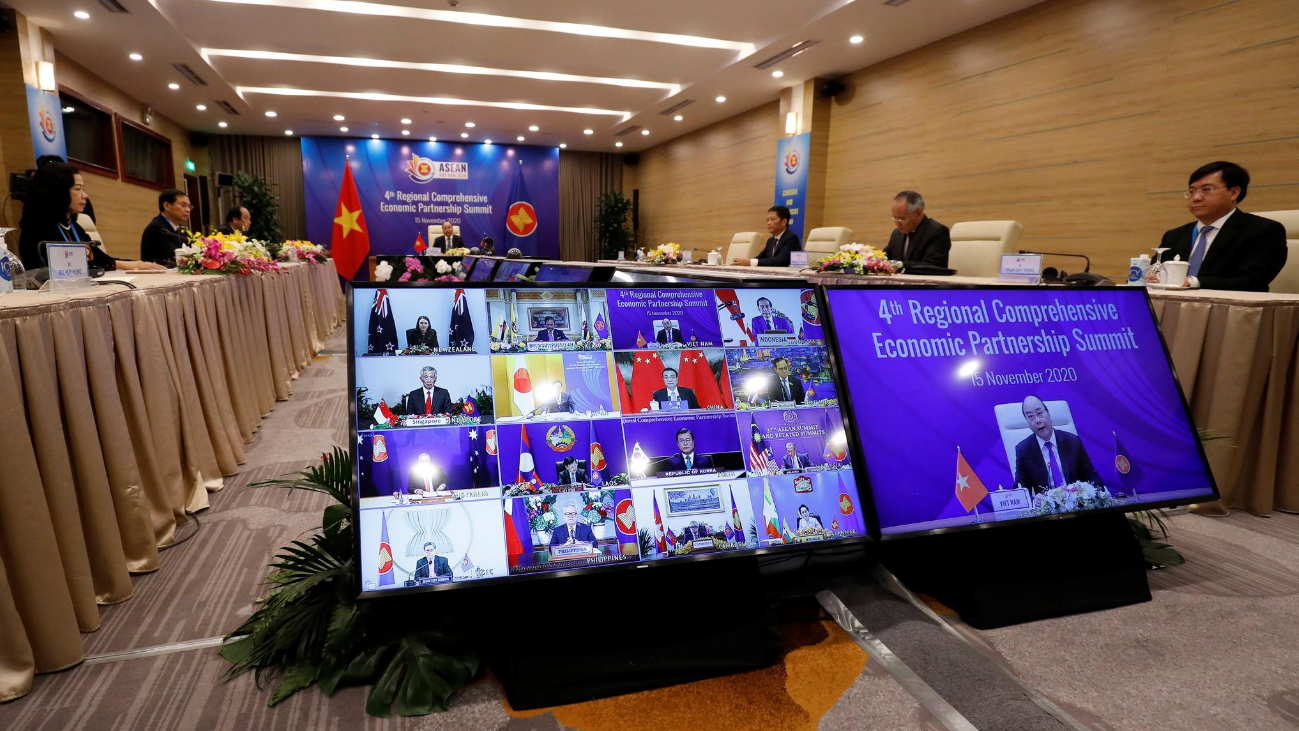
The long-awaited Regional Comprehensive Economic Partnership (RCEP), covering nearly a third of the global population and about 30 percent of global GDP, was signed by its 15 members on Sunday at the fourth RCEP summit in Hanoi.
It is the world's biggest free trade agreement (FTA) measured in terms of GDP, larger than the Comprehensive and Progressive Agreement for Trans-Pacific Partnership (CPTPP), the European Union, the recent U.S.-Mexico-Canada Free Trade Agreement or Mercosur, according to Rajiv Biswas, chief economist for the Asia-Pacific region of IHS Markit.
The agreement will promote fewer tariffs on trade in goods, and better rules for trade in services, including market access provisions for service sector suppliers from other RCEP countries. Besides, non-tariff barriers to trade among its members, such as customs and quarantine procedures and technical standards will be reduced.
It will also allow for one set of rules of origin to qualify for tariffs reduction with RCEP members. A common set of regulations mean fewer procedures and easier movement of goods.
Initiated by the Association of Southeast Asian Nations (ASEAN) in 2012, RCEP is a proposed FTA between the 10 ASEAN member states and their six FTA partners, namely China, Japan, South Korea, Australia, New Zealand, and India who was involved in earlier discussions but opted out last year.
Since its introduction at the 19th ASEAN Summit in November 2011, more than 30 rounds of negotiations and a number of intersessional and ministerial meetings on RCEP have been held.
In November last year, 15 participating countries of the agreement concluded text-based negotiations and essentially all market access issues at an RCEP summit in the Thai capital city of Bangkok.

The RCEP agreement will accelerate the building of the ASEAN economic community and thereby allow ASEAN to become dynamic and strong partners in promoting cooperation for shared prosperity, Vietnamese Prime Minister Nguyen Xuan Phuc said at the signing ceremony held via video conference.
Meanwhile, Chinese Premier Li Keqiang stressed that "the signing of the RCEP is not only a landmark achievement of East Asian regional cooperation, but also a victory of multilateralism and free trade."
China and Japan have reached a bilateral tariff reduction arrangement for the first time, achieving a historic breakthrough, according to China's Ministry of Finance (MOF) on its website.
The signing of RCEP plays an extremely important role in the economic recovery of its members in the post-epidemic period besides promoting long-term prosperity and development, the statement said.
Moreover, the preferential results of the agreement directly benefit consumers and enterprises and will play an important role in enriching consumer market choices and reducing enterprises' trade costs, the ministry noted.
"With RCEP, the ASEAN will continue to become an attractive investment destination and a promising market for partner countries," Vo Dai Luoc, former head of the Institute of World Economics and Politics under the Vietnam Academy of Social Sciences, told Xinhua.
The deal would also prompt the ASEAN to reform its business environment to meet investors' expectations, thereby enhancing transparency in trade and investment, Luoc said.
"This is a big statement for trade liberalization and for protecting the open global trading system," said Peter Drysdale, head of East Asian Bureau of Economic Research at Australian National University, according to Xinhua.
The signing ceremony took place during the ongoing 37th ASEAN Summit and related summits being held from Thursday to Sunday via video links.
Vannarith Chheang, president at Asia Vision Institute in Singapore told CGTN that "e-commerce is likely to be a priority for further RCEP talks," given that e-commerce is a booming industry across the region and the COVID-19 pandemic has accelerated the development of the industry since a substantial agreement was not achieved in the original RCEP framework.
The International Monetary Fund (IMF) in October adjusted Asia's economy forecast to 2.2-percent contraction this year from the previous forecast of -1.6 percent in June.
"Although China's recovery can boost regional trade, weak global growth, closed borders and festering tensions around trade, technology and security have worsened the prospects for a trade-led recovery in the region," the IMF said in a report on the Asia-Pacific region.
Read more:
RCEP will be the most significant trade agreement in modern history
(Cover: Vietnam's Prime Minister Nguyen Xuan Phuc chairs the 4th Regional Comprehensive Economic Partnership Summit as part of the 37th ASEAN Summit in Hanoi, Vietnam, November 15, 2020. /Reuters)

